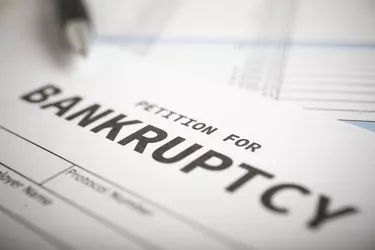
There's no legal mandate requiring you to keep your bankruptcy paperwork after your debts are discharged. Bankruptcy lawyers say, however, that for practical reasons you should keep your bankruptcy petition and discharge papers forever.
Discharge and Debt
Video of the Day
When you successfully complete bankruptcy, it's as if your debts never existed. Creditors cannot sue you, garnish your wages or levy your bank account once a debt is discharged. But that doesn't always prevent them from trying.
Video of the Day
Warning
Bankruptcy cannot wipe out some debts. It won't get you off the hook for back child support or debts you incurred through fraud, for instance.
Even after bankruptcy, you may be stuck with zombie debt rising from its grave. These are debts that haunt you after you're no longer obligated to pay. For example, a debt collector who purchased your account from the original creditor may sue you without knowing or caring that the debt has been erased. These debt scavengers may threaten to sue you for the debt, or use illegal tactics such as threats or harassing phone calls.
The Bankruptcy Papers
You originally launched your bankruptcy — whether it's Chapter 7 or Chapter 13 — by filing a bankruptcy petition. The petition included a list of all your debts. If you're the target of a debt scavengers, the Consumer Finance Protection Bureau recommends you review your copy of the petition to confirm you listed the debt. If you omitted it, it hasn't been discharged.
Once you're confident your debt was wiped out, you know the debt collector has no grounds to pursue you. If the collection efforts persist, attorney Dan Mueller notes that showing the collector a copy of the bankruptcy discharge should resolve the issue.
If you have misplaced your copy of the discharge, you can re-order one from the court. It's more convenient and less costly, however, to keep the original.
Stopping the Scavengers
If a debt scavenger keeps trying to collect after you've shown him you don't owe the money, you can report it to the bankruptcy court. A bankruptcy judge can fine anyone who attempts to collect on a discharged debt. You also can file a complaint with the CFPB or other consumer agencies.
Your Credit History
Mueller says it's also a good idea to keep your bankruptcy paperwork to compare with your credit report. In theory, once a debt is discharged, that should be reflected in your credit history. In practice, credit bureaus make errors. A copy of your bankruptcy paperwork is proof that the report should be updated.
Bankruptcy attorney Gene Melchionne says keeping your paperwork also is useful if you apply for a mortgage after bankruptcy. Even years after the bankruptcy, the underwriter may want confirmation that all your debts were wiped out and no longer affect your finances.
The Lawyer's Files
Lawyers have record-keeping obligations of their own, based on law and professional standards. The American Bar Association says the requirements for your paperwork depend in part on where you live: Florida, for instance, has a six-year retention policy for client papers, while New Jersey requires seven. Before finally shredding your old paperwork, attorneys should make a good-faith effort to contact you and see if you want to collect the documents.